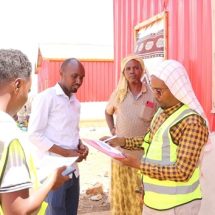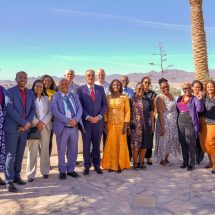Right in M’bour, Senegal, coordinated efforts gathered to give momentum for data-driven land management. On 14th August 2023, UN-Habitat and the National Agency for Statistics and Demography (ANSD) kicked off the validation of the Status Report on the availability of data on land governance and tenure security in Senegal.
Land remains an important subject in Senegal’s history. The importance and performance of land brought great attention to the workshop. Available data reveals that land tenure insecurity is still persistent in Senegal. Despite the 2001 Constitution and other statutory laws, land access and use are primarily regulated by customary law. While a considerable population holds highly perceived tenure security, the proportion with documented rights remains modest.
This past August 14, 2023, marked the completion of the project “Disaggregated Indicators on Land Rights Security for Policies and Actions that Leave no one Behind in Africa” in Senegal with the validation workshop held in M’bour. Senegal is one of the project’s five targeted countries of the project. The meeting achieved solid recommendations to facilitate implementation of the joint methodology for collecting data and reporting on SDG indicators 1.4.2 and 5.a.1 at the national level. The workshop will empower data-informed land tenure management and decision-making, alleviating poverty and improving land access in the long term.
To acquire wide opinions and understand the national land governance situation, an initial technical meeting held in December 2022 gathered experts from different state institutions to discuss the state of security of land rights, the availability of land data, and the adaptation of a questionnaire for the integration of the two indicators in future statistical surveys.
After the technical meeting, GLTN, together with the National Agency for Statistics and Demography (ANSD), continued working together to develop a national assessment report on the status of security of tenure and land governance data. Hosted by GLTN through the Global Land Indicator Initiative (GLII), and UN-Habitat Data and Analytics Unit, this united effort successfully validated the final draft of the technical paper.
The workshop proceeded by dividing into groups of experts. Group A looked at the land management in Senegal including the land context, land tenure, and gender, land, and rural activities. The second group continued the review of Group A’s work and was responsible for the sources and analysis of existing land data and adaptation of the joint module. After the group work, the participants met in plenary to present the final version of the document for validation.
The commitment of various national stakeholders underscores the need for enhanced coordination and collaboration – particularly by ANSD, the de jure coordinator of the national statistical system (NSS), for integrated data initiatives to ensure data availability for holistic policy insights. Nevertheless, with the partners’ determination after the conclusion of this project, Senegal will be able to advance on indicators 1.4.2 and 5.a.1 on land governance and tenure security. These indicators will quantify the efforts needed to achieve gender equality in access to agricultural land and evaluate the security of land tenure by gender, type of tenure, and typology of tenure.
With the training, survey instruments and tools adapted to the Senegalese situation, the central government and the statistical agency will be better equipped to design land policies and manage land properties, which will become a good example for other UEMOA/WAEMU Member States.
As co-custodians of SDG land indicators 1.4.2 and 5.a.1 – UN-Habitat is actively promoting sustained discourse and momentum towards land monitoring. Opportunities hold for other states facing similar challenges and custodians look forward to further collaboration in enhancing data availability, accessibility, and use for enhanced policies and practices toward good land governance and tenure security.











